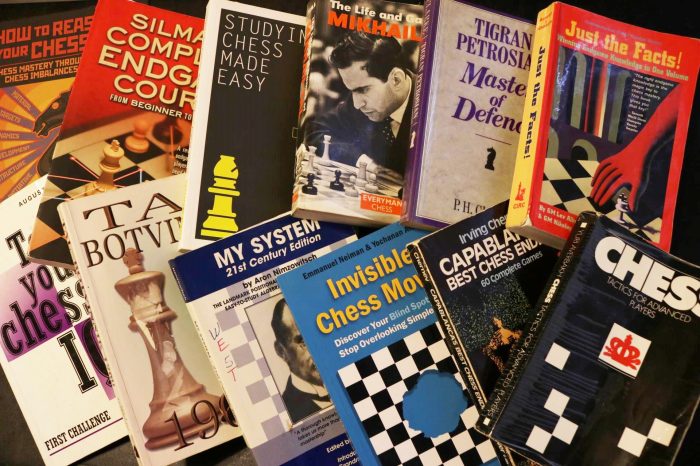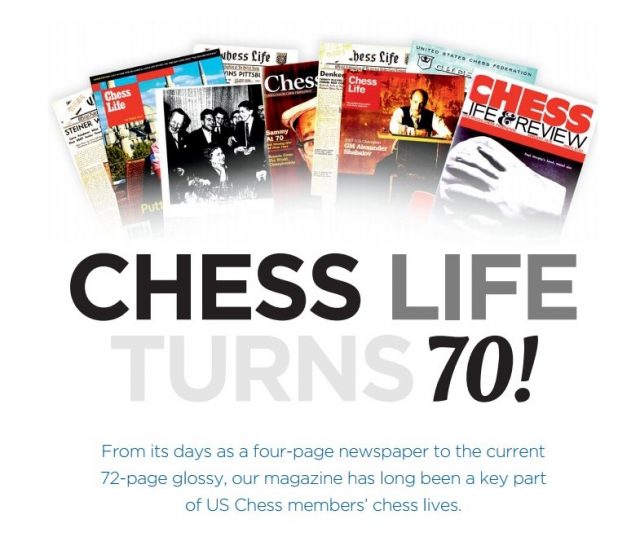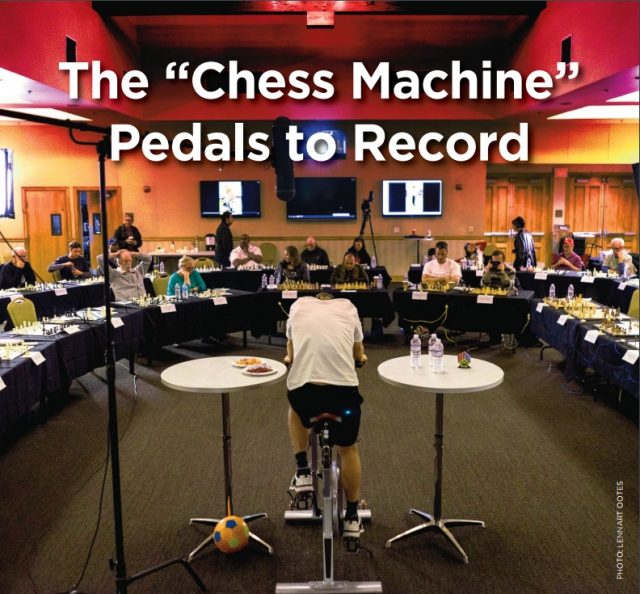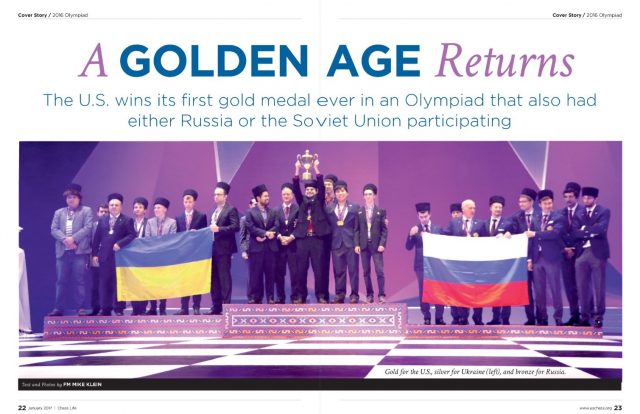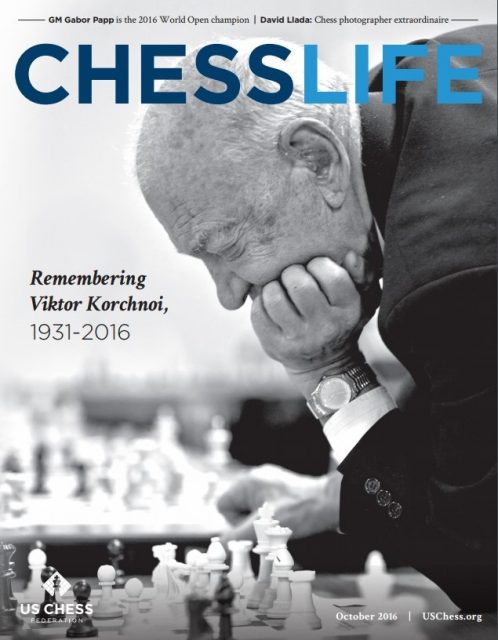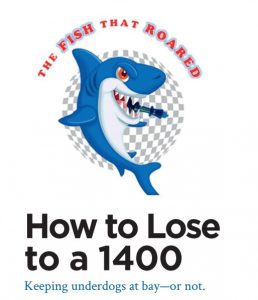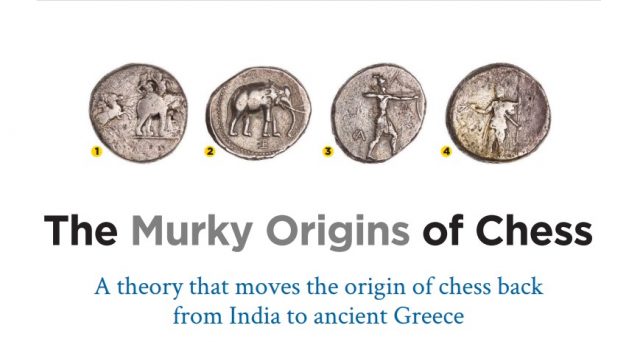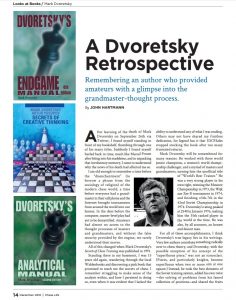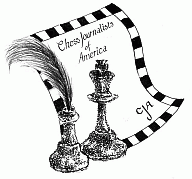 US Chess is honored to announce that both US Chess News and Chess Life Magazine have won several prestigious awards from the Chess Journalists of America’s annual competition.
In addition, three US Chess writers won awards in the "Top Four" of the competition:
US Chess is honored to announce that both US Chess News and Chess Life Magazine have won several prestigious awards from the Chess Journalists of America’s annual competition.
In addition, three US Chess writers won awards in the "Top Four" of the competition:
- Vanessa West as Chess Journalist of the Year
- Al Lawrence for the Best Story of the Year: "Chess Life Turns 70!" in Chess Life Magazine, September 2016
- Andy Soltis for the Best Chess Column: "Chess to Enjoy" in Chess Life Magazine
US Chess News
Chess Journalist of the Year
Vanessa West
"What makes someone a great chess journalist? It's a difficult question to answer. As writers, we send our stories, considerations, and opinions out into what can feel like a void. Beyond a handful of comments posted beneath the article, sporadic social media shares, and the occasional reader mentioning it in-person, it's hard to know who's reading or if an article achieved its desired effect. All we can do is learn from the feedback you do receive and keep trying--keep sending our words out into the world until something gets through… … My article, "Should Women's Chess Titles Be Eliminated?" had an especially surprising reach and effect. For as long as I can remember, the issue has been important to me, but I didn't know how to coherently express my viewpoints. In addition, many in the chess world disagree with my point of view, and I wanted to write the article in a way that could possibly bridge the gap. I worked on that piece on and off for pretty much a year before it reached the published version. While the subject of the article is women's chess titles, what I was really aiming for was much bigger: an inspirational piece aimed to get the community to rethink and improve the approach to gender and chess as a whole. About a week after the article was published, I was browsing Twitter and thinking about how all of the comments and discussion of my piece were likely going to fizzle out soon. As I scrolled down, I came across a Chess.com post with a preview of their latest Chess Center video, and, to my great surprise, I saw the title of my article. The video, "Chess Center: Eliminate Women's Titles?", mentions my piece and has a guest, WFM Alexandra Botez, discuss the issues of women's titles and women's events in detail. I never dreamed that an article I wrote would get that kind of exposure. It meant the world to me that readers gave my words such thorough consideration." -Vanessa West, excerpt from her nominating statement
Best Chess Photojournalism
Honorable Mention:
The Shaman Sees Checkmate: Teaching Chess in the Amazon by Vincent Roazzi Jr.
 Photo: Vincent Roazzi Jr.
Photo: Vincent Roazzi Jr.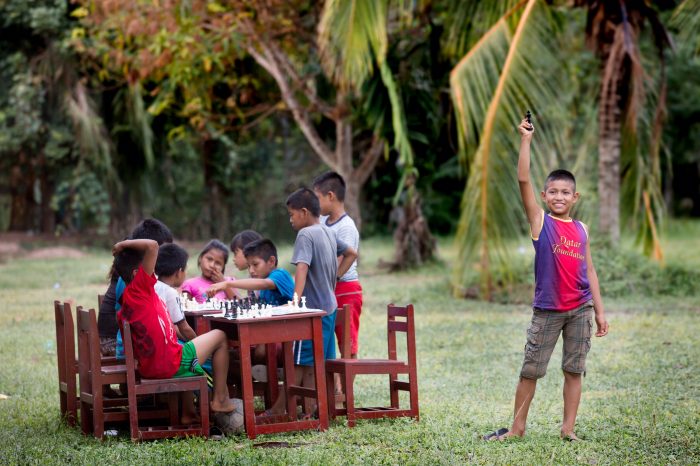 Photo: Vincent Roazzi Jr.
Photo: Vincent Roazzi Jr.Best Tournament Report - Online - National/International
Honorable Mention:
A Winner's Tale: GM Chirila on Millionaire Chess 2016 by GM Cristian Chirila
"Millionaire Chess, the open tournament that tried to defy the rules most chess opens stand by, has closed its gates, possibly for the last time, on October 10. It was a bittersweet moment, entertained by Maurice Ashley’s tireless entrepreneurial spirit and stage persona. He talked about his dream, his partner in crime Amy Lee, as well as his almost never-ending organizational struggles. He was visibly shaken, concerned, but also full of hope and optimism that he will find the support to extend this great tradition that Millionaire Chess has become. My name is Cristian Chirila, I am the winner of the U2550 section and I would like to take you, the reader, through the last stand of my millionaire journey. Here we go!"
Honorable Mention:
Kostya's Magical Reykjavik Open: A Recap! by IM Kostya Kavutskiy
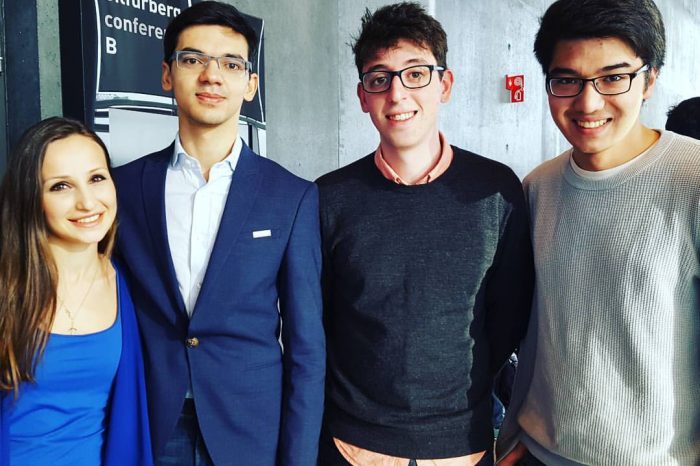
"I had the 2017 Reykjavik Open in my sights for a couple of months. After earning my final IM norm back in November and immediately tanking at the 2016 North American Open in December, I took a much-needed break away from competitive chess to re-evaluate where I was at and ask myself some tough questions. Did I still want to put in the immense time and effort to pursue the grandmaster title?
Well yes, yes I did. OK maybe it wasn’t too difficult to answer the question. But as I started to ponder over which tournaments I should play to take my chess to the next level, everything about the upcoming Reykjavik Open just seemed to fit—the timing was good, the field was incredible, with stars like Anish Giri, Baduur Jobava, Alexei Shirov, Alexander Beliavsky (!) among others, and the fact that it’s become cheaper to fly to Iceland than ever before really cinched it for me, not to mention the large number of Americans that play in the event every year."
.
Best Tournament Report - Online - State/Local
Winner (tied):
Lucky and Good: Lenderman and Yip Score at the Eastern Open by Jamaal Abdul-Alim
"When Nikki Khmelnitsky and Prani Gunasekaren first started playing at the Tri-Bridges Chess Club back in 2013, neither girl had an official rating. So it ended up being a sweet reunion this past week when they met up here at the 43rd annual Eastern Open and both girls scored five out of six points — despite squaring off against each other in Round 4 — to share first place in the Under 1300 section... As for Nikki and Prani — the two young girls who won the Under 1300 Section — both were also accompanied by very supportive fathers. In the case of Nikki, her father was on hand to promote and sign copies of his “Chess Exam” series of books. “I used to be a professional player,” explained IM Igor Khmelnitsky, who works as a health insurance company actuary. “Now, I’m a professional father. And I’m a driver, too,” he joked in reference to driving his daughter from the Philadelphia area to the Greater Washington, DC area to play in the Eastern. In the case of Prani, her father, Guna Kuppusamy is a software architect with a specific reason for supporting his daughter in chess. “I want her to be a champion in chess so that we can show this achievement and get some scholarships when she goes to college,” Kuppusamy said. He said chess helps build math and analytical skills. “That’s why I want her to concentrate on a mind game.”
.
Best Instructive Lesson - Online
Winner:
What is Your Goal in Chess? by Vanessa West
"What is your goal in chess?“I’d like to break 2200 by the end of the year.”
“I want to earn my 3rd IM norm at my next tournament.”
“Ultimately, I dream of becoming a grandmaster.”
When you ask someone the question above, these are the expected answers. For many, a concrete goal, such as a title or rating, is a huge motivation, the light at the end of the tunnel that justifies all of their hard work. For my own progress, however, I’ve found these types of goals to be counter-intuitive: They add extra pressure and lead me to focus on scoreboard points and rating progress instead of what matters most when I’m competing: learning and improving."
Honorable Mention:
How to Study Chess by Vanessa West
.
"I can trace nearly every peak rating I’ve ever had to time spent studying a specific book. A good chess book holds an entire world of understanding within its pages. It’s hard to put down, full of entertaining prose and fascinating games.
Ideally, when you’re about midway through, you start to see its effect on your own games. You notice things you didn’t before. If it’s a Tal book, suddenly, you find intriguing opportunities to sacrifice at every turn. If it’s a tactics book, your pieces begin to come alive at the hint of a loose piece in the enemy position. If it’s a positional text, it becomes second nature to hunt down your opponent’s weak pawns. How do you choose the books that will help you improve the most? And, is there an optimum way to study? While there is no shortage of chess books, many of which are excellently-written, remembering and using the knowledge consistently in your own games can be another story. These are the training methods and materials that have helped me improve the most over the years—with an emphasis on the 1500-1900 level."
Best Review - Online
Winner:
Chess Tech University: Philosophy and Game Analysis: Part I
and Part II by John Hartmann
"In showing this game, I am not trying to hold my play up as some model for others to follow. I did not play particularly well, and I did not see my opponent’s tactical ideas very clearly. Still I think there is value in using a game like this, warts and all, as an example of how to work on our own games. Effective chess training, as we have seen, tries to rewire our intuition or ‘chess subconscious,’ burnishing our strengths and shoring up our weaknesses. A serious analysis of one’s own games is fundamental to this task, and used judiciously, the computer can play a critical role in this process. Having heeded the Delphic admonition, what do we do with this self-knowledge? How do we structure our training? In my case, openings are not a problem, and my tendency to overvalue the bishops was muted here. While I’m good at converting technical advantages, my calculation was not stellar in this game, and I continue to underestimate my opponent’s passed pawns. There are, as always, things I need to do to improve."
Honorable Mention:
Magnus Carlsen on the Simpsons: The Portrayal of Chess in Pop Culture by Vanessa West
"For months, the chess world has awaited Magnus Carlsen’s cameo on The Simpsons. Magnus Carlsen is pop culture’s favorite chessplayer, bringing chess into many unlikely spaces, even modeling campaigns and a Porsche commercial. The Simpsons is a staple of American culture and the longest-running American sitcom, currently on its 28th season. The show has featured cameos from names as notable as Paul McCartney, Stephen Hawking, Dolly Parton, Conan O’ Brien, Venus and Serena Williams, Betty White, Elton John—the list goes on and on. Magnus Carlsen’s cameo is a big step for the game into mainstream culture. In fact, the show featured chess as a focal point throughout the entire episode. On the other hand, pop culture has a habit of misrepresenting chess, often featuring everything from incorrectly set-up boards to huge misunderstandings of the game and the culture. How did The Simpsons portray chess when writing a Magnus Carlsen storyline? Let’s take a look."
.
Chess Life Magazine
Best Story of the Year
Winner:
Chess Life Turns 70! by Al Lawrence, September 2016
"By all accounts, Montgomery Major was a cantankerous man. But after all, he was an editor. There’s a lot of pressure in that profession. It’s one of those jobs where people don’t notice you until you do something they really don’t like.
American chess history owes Major more than forbearance. In September 1946, as the world was settling down to quieter pursuits after the inferno that was World War II, Major produced the very first Chess Life (CL). Since that time, as reliable as a full moon, the flagship for American chess has brought its readers instruction, news, and, most important, a feeling of belonging. This month Chess Life is 70 years old, a biblical lifetime. Along this stretch of decades, a number of Major’s successors—although never matching his irascibility— nurtured and reshaped our publication to keep it relevant as America morphed through a series of profound cultural transformations.
As you leaf through this month’s pages, you see that Chess Life hardly seems old at all. To see how far we’ve come, compare the front page of the first issue of CL, opposite page, with the cover of the current issue.
The early Chess Life was a primitive, black-and-white newspaper. Seventy years later, it’s a sophisticated, full-color magazine that begs no apology next to anything on the varnished news racks at Barnes & Noble. I could say they’re apples and oranges, except that they’re very much from the same seed. It’s more a case of an acorn becoming an oak."
Honorable Mention:
GM Timur Gareyev Sets Blindfold Chess World Record by Jay Stallings and Jennifer Vallens, March 2017
"Grandmaster Timur Gareyev not only broke the blindfold chess world record by successfully completing 48 simultaneous games on December 3-4, 2016 in Las Vegas, Nevada, he did so with style and panache. While besting the record of 46 set by German FM Marc Lang in 2011, he managed to accomplish the feat in less time, against a similarly-rated field, with an impressive 80.2 percent winning percentage (compared to Lang’s 75 percent).
The Uzbekistan-born, but now world travelling grandmaster, played 1,370 moves over 19 hours—and never once saw a board."
.
Best Chess Column
Winner:
Chess to Enjoy by GM Andy Soltis, June 2016 and August 2016
"IMAGINE THAT YOU GOT OFF A TRAIN in an unfamiliar city. You need directions so you stop a passerby and ask how to get to your destination.
“Deserving attention is to go three blocks to the left,” he replies.
Then he pauses and adds, “Also possible is one block to the right.”
After another pause: “Worthy of consideration is four blocks straight ahead.”
You’d think you were in a strange country. You are. You’re in Annotation-land.
It’s a realm that has its own quaint laws, tribal customs and a form of language unknown anywhere else on the planet."
Honorable Mention:
The Practical Endgame by GM Daniel Naroditsky, July 2016 and October 2016
"I HAVE YET TO MEET A HUMAN BEING, much less a chess player, who likes to make decisions. In fact, I don’t remember the last time I ate in a restaurant and was truly satisfied with the dish I chose. Even if the Spaghetti Bolognese was very tasty, a part of me will regret not ordering the famous Pizza alla Diavola, while a second part of me will regret choosing this overpriced pizzeria over the cheap Thai place around the corner. Then, a third part of me will tell my second and first parts that I’m at a tournament, and that I’m here to play good chess and not to digest.
Analogous decision-making problems befall every chess player throughout each game. Should I trade bishops here? Swap queens there? Should I sacrifice an Exchange for an attack? Is that pawn really hanging, or does my opponent have something up his sleeve? Most experienced players have more or less come to terms with the fact that one cannot make decisions with 100 percent accuracy, yet we all suffer from a tendency to put off important decisions because of our fear of being wrong. In the endgame, when each decision has the potential to decide the outcome, this tendency is particularly evident. In this month’s column, we will examine one of my recent endgames in which I grappled with this exact problem."
.
Best Chess Photojournalism
Winner:
David Llada: A Common Thread, October 2016
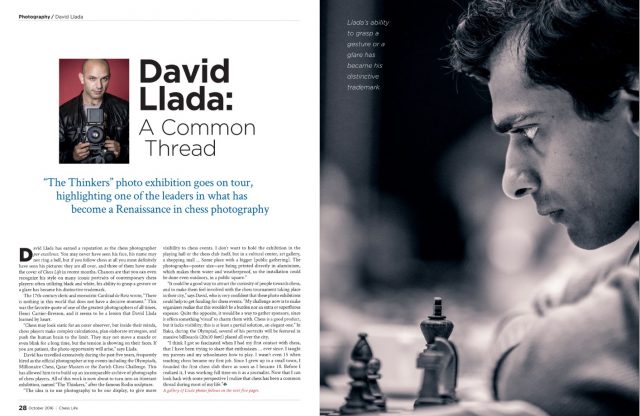
.
Best Single Photo
Winner:
Karjakin Set to Challenge Carlsen by David Llada, June 2016
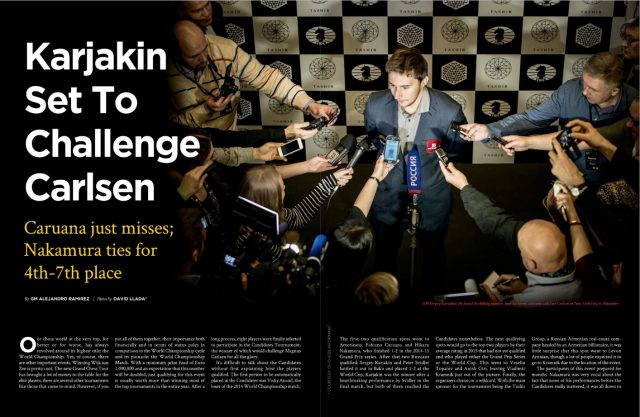
.
Best Chess Art
Winner:
Chess Life Turns 70! - Cover, by Scott Raymond, September 2016
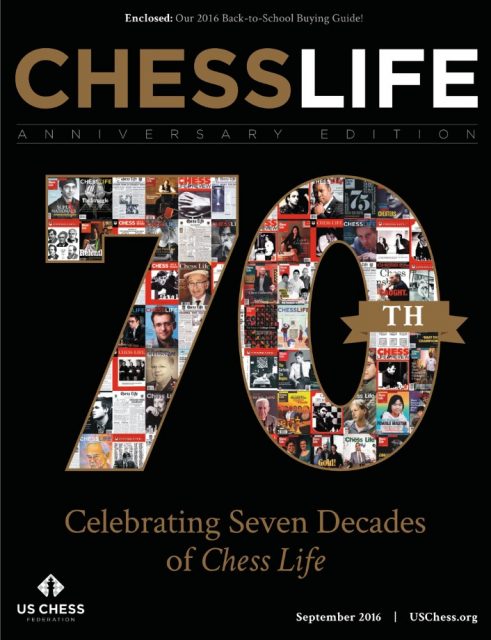
Best Tournament Report - Print - National/International
Winner:
A Golden Age Returns by FM Mike Klein, January 2017
.
"If chess stats included “assists,” GM Matthias Bluebaum earned one with his unwitting Midas touch. Matthias who? The German teenager's seemingly irrelevant win, played on the third board of table 28 in the final round of the 42nd Chess Olympiad, meant everything to the U.S. National Team playing a hundred feet away. Thanks to the tenebrous tiebreak calculations, Bluebaum's victory over an Estonian international master sealed for the Americans their first team gold medal at the Olympiad since one week after Jimmy Carter was elected president.
“Bluebaum” instantly became the answer to obscure chess trivia, but his contribution was nothing compared to having three world top- 10 players on the squad. Two medaled indi vid - ually. Board one GM Fabiano Caruana picked up an individual bronze and third board GM Wesley So grabbed another gold.
If that 1976 win had a giant asterisk beside it, thanks to a boycott by the Soviet Union and other Eastern Bloc powerhouses, this one had only dominance. The U.S. was one of only two teams to finish without a match loss."
Best Features Article - Print
Winner:
A Complicated Man by GM Yasser Sierawan, October 2016
.
"While still reeling from the loss of Muhammed Ali and the musician Prince, the news only got worse when Viktor Lovovich Korchnoi (March 23, 1931-June 6, 2016) passed away as well. It was a stunning confluence of events. It felt as if the giants in my life were falling as a group.
To say that Viktor was a complicated man is an understatement. He was at times: Thought - ful, irascible, quick to anger, funny, reflective, quirky, stubborn, generous, ferocious, kind, endearing as well as fiercely loyal. All of these descriptions and far more spring to mind when I think of Viktor. He played an outsized role in my life and one for which I’ll be eternally grateful."
Best Instructive Lesson - Print
Honorable Mention:
How to Lose to a 1400 by FM Jon Jacobs, August 2016
"Overcoming an 800-point rating gap is a singular feat. It takes skill, guts, dogged determination, and either the foresight or the good fortune to bring about the kinds of positions where the underdog is most comfortable and the favorite is least able to utilize his superior skills or knowledge. Perhaps most important of all, it requires a good bit of cooperation from one’s opponent...
...In the game below, I defied the statistical odds by losing to someone more than 800 points below my rating. Wherever you fall on the rating spectrum, I hope you may benefit from the following step-by-step primer on how I did it. I cannot claim sole credit: as you will see, Mr. Sutton supplied the requisite cooperation, by roundly outplaying me."
.
Best Historical Article - Print
Honorable Mention:
The Murky Origins of Chess by Dr. Gerald M. Levitt, May 2017
."We know that chess started to change into its present level of development when a predecessor game to chess, chaturanga, was born. From written and art evidence we can prove that evidence of the existence of chaturanga was first recorded around the sixth century A.D. in India. Chaturanga evolved into medieval (or slow chess), which later became our modern chess. There is no doubt that this metamorphosis from chaturanga to slow chess took place in India, and India is rightfully known as the birthplace of modern chess. But there are questions about the origins of chess that remains unanswered, such as: How did it come to be in India? Indeed, how did it come to “be”?"
Best Humorous Contribution - Print
Winner:
How to Lose to a 1400 by FM Jon Jacobs, August 2016
.
Best Review - Print
Winner:
Dvoretsky Retrospective by John Hartmann, December 2016
"After learning of the death of Mark Dvoretsky on September 26th via Twitter, I found myself standing in front of my bookshelf, thumbing through one of his many titles. Suddenly I found myself hurled back in time, much like Marcel Proust after biting into his madeleine, and in unpacking that involuntary memory, I came to understand why the news of his death had affected me so.
I am old enough to remember a time before the “disenchantment” (to borrow a phrase from the sociology of religion) of the modern chess world, a time before everyone had a grand - master in their cell phone and the Internet brought tournaments from around the world into our homes. In the days before the computer, master-level play had yet to be demystified. Amateurs had al most no access to the thought processes of masters and grand masters, and without the false security provided by the engine, we rarely understood their moves.
All of this changed when Mark Dvoretsky’s Secrets of Chess Training was published in 1991.
Standing there in my basement, I was 15 years old again, wandering through the local Waldenbooks and discovering a pink book that promised to teach me the secrets of chess. I remember struggling to make sense of the analysis within, and how I persisted in doing so, even when it was evident that I lacked the ability to understand any of what I was reading. Others may not have shared my fruitless dedication, for legend has it that USCFSales stopped stocking the book after too many frustrated returns.
Mark Dvoretsky will be remembered for many reasons. He worked with three world junior champions, a women’s world championship challenger, and a myriad of masters and grandmasters, earning him the unofficial title of “World’s Best Trainer.” He was a very strong player in his own right, winning the Moscow Championship in 1973, the Wijk aan Zee B tournament in 1974, and finishing =5th-7th in the 42nd Soviet Championship in 1974. Dvoretsky’s rating peaked at 2540 in January 1976, making him the 35th ranked player in the world at the time. He was also, by all accounts, an honest and decent man.
For all of these accomplishments, I think Dvoretsky’s true legacy lies in his writings."
Honorable Mention:
Everyman Roundup by John Hartmann, October 2016
"Some years ago I gave a talk at a university in New York about how we might use the technology of chess to better understand the nature of technology. I argued that modern chess players were, for all intents and purposes, cyborgs."Stay tuned for Chess Journalist of the Year Vanessa West’s five chess writing tips! For a complete list of 2017 award winners, visit the Chess Journalists of America Official Website.
Categories
Archives
- January 2026 (13)
- December 2025 (27)
- November 2025 (29)
- October 2025 (39)
- September 2025 (27)
- August 2025 (29)
- July 2025 (43)
- June 2025 (25)
- May 2025 (24)
- April 2025 (29)
- March 2025 (29)
- February 2025 (20)
- January 2025 (24)
- December 2024 (34)
- November 2024 (18)
- October 2024 (35)
- September 2024 (23)
- August 2024 (27)
- July 2024 (44)
- June 2024 (27)
- May 2024 (31)
- April 2024 (51)
- March 2024 (34)
- February 2024 (25)
- January 2024 (26)
- December 2023 (29)
- November 2023 (26)
- October 2023 (37)
- September 2023 (27)
- August 2023 (37)
- July 2023 (47)
- June 2023 (33)
- May 2023 (37)
- April 2023 (45)
- March 2023 (37)
- February 2023 (28)
- January 2023 (31)
- December 2022 (23)
- November 2022 (32)
- October 2022 (31)
- September 2022 (19)
- August 2022 (39)
- July 2022 (32)
- June 2022 (35)
- May 2022 (21)
- April 2022 (31)
- March 2022 (33)
- February 2022 (21)
- January 2022 (27)
- December 2021 (36)
- November 2021 (34)
- October 2021 (25)
- September 2021 (25)
- August 2021 (41)
- July 2021 (36)
- June 2021 (29)
- May 2021 (29)
- April 2021 (31)
- March 2021 (33)
- February 2021 (28)
- January 2021 (29)
- December 2020 (38)
- November 2020 (40)
- October 2020 (41)
- September 2020 (35)
- August 2020 (38)
- July 2020 (36)
- June 2020 (46)
- May 2020 (42)
- April 2020 (37)
- March 2020 (60)
- February 2020 (38)
- January 2020 (45)
- December 2019 (34)
- November 2019 (35)
- October 2019 (42)
- September 2019 (45)
- August 2019 (56)
- July 2019 (44)
- June 2019 (35)
- May 2019 (40)
- April 2019 (48)
- March 2019 (61)
- February 2019 (39)
- January 2019 (30)
- December 2018 (29)
- November 2018 (51)
- October 2018 (45)
- September 2018 (29)
- August 2018 (49)
- July 2018 (35)
- June 2018 (31)
- May 2018 (39)
- April 2018 (31)
- March 2018 (26)
- February 2018 (33)
- January 2018 (30)
- December 2017 (26)
- November 2017 (24)
- October 2017 (30)
- September 2017 (30)
- August 2017 (31)
- July 2017 (28)
- June 2017 (32)
- May 2017 (26)
- April 2017 (37)
- March 2017 (28)
- February 2017 (30)
- January 2017 (27)
- December 2016 (29)
- November 2016 (24)
- October 2016 (32)
- September 2016 (31)
- August 2016 (27)
- July 2016 (24)
- June 2016 (26)
- May 2016 (19)
- April 2016 (30)
- March 2016 (36)
- February 2016 (28)
- January 2016 (32)
- December 2015 (26)
- November 2015 (23)
- October 2015 (16)
- September 2015 (28)
- August 2015 (28)
- July 2015 (6)
- June 2015 (1)
- May 2015 (2)
- April 2015 (1)
- February 2015 (3)
- January 2015 (1)
- December 2014 (1)
- July 2010 (1)
- October 1991 (1)
- August 1989 (1)
- January 1988 (1)
- December 1983 (1)


